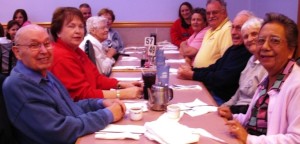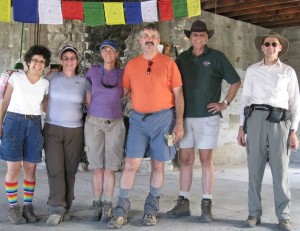 As we get more involved with caregiving, our pre-caregiver friends seem to drift away.
As we get more involved with caregiving, our pre-caregiver friends seem to drift away.
Friends we socialized with at monthly outings, don’t come around as often. They don’t invite us to lunch. They don’t even call about visiting, anymore. It seems we’ve grown apart.
Wasn’t it Ecclesiastes who advised? To every thing there is a season, and a time to every purpose…
How do caregivers find new friends?
In Support Groups
I never thought I’d attend a support group. But when I needed to learn to cope better with my father’s behaviors as he tried to live with dementia, I marched straight into those weekly meetings. I even attended meetings online! While my colleagues and long-time friends fell into the background, I felt comforted by strangers; some, who I would never meet in person.
While I served as my father’s caregiver, new connections with caregivers grew into family.
This was especially comforting, because who else can understand what’s involved in caregiving besides another caregiver?
Even the online (virtual) connections through caregiver forums helped create a feeling of community. Today, social media connections like Facebook and Google+ grow into strong connections that provide mutual support.
At a Caregiver Retreat
If you’re fortunate to go on a caregiver retreat, then you are one of the lucky caregivers who will form long-term relationships with other caregivers. These retreats are important for a much-needed caregiver respite. And they’re crucial to ensuring you re-energize in order to continue providing optimal care. Plus, connecting with fellow caregivers in a FUN yet relaxing atmosphere where you can explore your challenges and find creative solutions is an ideal way to build relationships with other caregivers. Most retreats are either one night or two — brief enough to get away after making arrangements.
What about making friends after caregiving?
There’s always that fear of loneliness after caregiving.
Rest assured, in many cases, caregivers become friends for life.
But what about getting away from caregiving and trying to return to a more normal life?
My experience has been that some of my friends and colleagues who went by the wayside while I was in the throes of caregiving, are now returning to my life. A lot of this is due to social media such as LinkedIn, Facebook, and Google+.
Advantage of growing older — knowing yourself more.
One advantage of growing older is getting to know ourselves better. The older I get the more comfortable I feel with myself and the unique gifts I bring to this world. Each of us should feel the same and be more selective in what we choose to do in our lives and with whom.
Sadly, there is never enough time. I feel I spread what little time I have, too thinly among those I care about.
The truth is, the older we grow — usually after age fifty — we realize there are fewer years ahead of us than behind us, we feel a sense of urgency and have greater confidence in choosing whom we spend our time with.
We discover people who come into our lives who align so well with our own unique qualities, that we wonder why we’re wasting time with those who criticize us (teasingly), yet leave us to question privately whether we’re normal — whatever that is.
Take a class. Volunteer.
Help raise funds for a cause you believe in. Attend events in your community. Take courses at your local community college. The people you meet will bring new meaning to your life.
All of these are great ways to grow new friends. We meet new people. We see how they work and overcome obstacles. We celebrate together and grow new relationships.
And remember, the words of Ecclesiastes: To every thing there is a season, and a time to every purpose…
Not all friendships will last… while others will endure through the years.
Although it will be hard in some cases to let go of friends, there will be other friends who keep the thread of our lives intact. My old college buddies who I don’t see as often as I’d like can pick up a conversation right where we left off… five years ago! The scary truth is admitting how long we’ve known each other — in some cases, since the late 1970’s. Am I THAT OLD?
This topic was inspired by Leslie Mann’s article, in a special to the Tribune papers: How to make new friends when you’re an adult.










The friendship and love that I have witnessed at support groups is awesome. Also, now that I volunteer, I make friends this way just like you mention. It’s great be doing something we love ,and building friendships and experiences at the same time.
Yes, I agree, Mike. Thank you for volunteering and for proving that caregivers make great friends. 🙂
Thanks for covering this topic Brenda, and sharing about your experience! It’s true the social media is helping to bring people together who are distant or had previously fallen out of touch, as well as helping to create friendships among caregivers in online support groups. For those in the throes of caregiving, Paula Spencer Scott (Caring.com contributing editor) also has some friendship tips aligned with those you shared: http://www.caring.com/articles/how-to-keep-friends I liked your ideas for post-caregiving as well. I would just add: Don’t feel you have to leave the caregiver groups once you’re no longer caregiving — you’re still an expert who can help others beginning the journey. On Caring.com, some of our most active members or ‘super users’ are former caregivers who’ve made some great friends in the online support groups and enjoy welcoming and helping the newcomers too. Some have shared about meeting up offline too — the online relationships leading to offline friendships. Studies have shown that people with strong friendships enjoy better health and have a more positive outlook — so thank you for helping caregivers by offering the suggestions you did!
Denise, thank YOU for writing. Caring.com’s site was one of the more recent ones I thought of as I wrote this piece. And I agree. Stick with your family–your support group–even after you’re finished caregiving. I stayed for three more years! While your experience helps others, sharing, also helps you deal with your grief and even guilt. Although, no one should feel guilty for doing the best job possible given the circumstances.